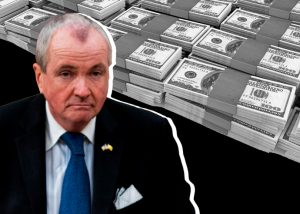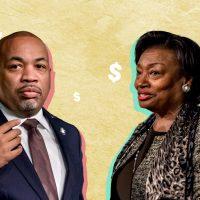People will always want to live and work in New York … until they don’t.
And some real estate professionals and economists fear that $4.3 billion in tax increases, on top of the shift to remote work, might just push some over the edge.
The state budget, now in the final stages of negotiations, is expected to include tax increases through 2027 on the personal income of New York’s highest earners and on corporate income. The real estate industry has consistently opposed such measures, fearing they will drive away high-net worth individuals and businesses.
“My initial reaction was ‘ouch,’” said Brian Lewis, a broker at Compass. “There’s a fine line between creating a pay-your-fair-share environment and a get-out-of-here, kick-them-out [environment].”
“You’ve got to find the balance,” he said.
Companies choose locations based on myriad factors, and local tax rates are rarely the main driver. Revenue from the New York hikes is expected to go toward school aid and rent arrears, including for small businesses, tenants and possibly undocumented immigrants.
Still, critics argue that as the city recovers from the pandemic and navigates a new working environment, legislators should focus on attracting businesses, not raising their taxes.
Read more


Sam Chandan, who heads New York University’s Schack Institute of Real Estate, said that notwithstanding the challenging fiscal outlook for New York City and the state, raising taxes on the most mobile residents and businesses is counterproductive.
“The increase reflects a deterioration in public tax efficiency and, at least on the margin, will render us less competitive in attracting and retaining the businesses and skilled residents that are essential to long-term growth in the tax base,” he said.
A 2015 study by advisory firm KPMG and the Tax Foundation, a think tank that tends to oppose tax increases, ranked New York dead last in corporate income tax levels paid by corporate headquarters, research and development facilities, and retail stores, which respectively paid 85 percent, 107 percent and 71 percent more than the national median. (At the time, the state had a corporate tax rate of 7.1 percent, which was subsequently reduced to 6.5 percent.)
Yet New York City still commanded among the highest rents in the nation, indicating that companies consider its taxes in context with its strengths, such as talent base, culture scene, tourism and transit network. And the number of billionaires calling the city home has risen to a world-leading 113, by one count, since a 2009 statewide tax hike on high earners.
The Tax Foundation’s Jared Walczak said that the city had survived high taxes and other expenses because people wanted to be there. The pandemic has changed that equation.
“They’re willing to pay higher cost of living and higher taxes for the privilege of living and working in New York. But that’s not unlimited,” he said. “The tax hikes come at the time of increased mobility. … More businesses will be able to locate in whichever environment makes the most sense for them without worrying about whether all their employees want to follow them — because they can work remotely.”
The state’s budget was due April 1, but lawmakers are expected to finalize it this week.
Budget negotiations have been contentious, with the Senate and Assembly calling for more than $7 billion in tax increases. In January Gov. Andrew Cuomo proposed $1.5 billion in tax hikes in the event that the federal government only sent the state $6 billion in pandemic aid. Yet after Washington sent $12.6 billion, Cuomo, who in 10 years as governor has extended the millionaires’ tax several times but never raised income taxes, agreed to do so for high earners, according to several publications.
Lawmakers and the governor reportedly settled on a 9.65 percent tax rate for individuals making more than $1 million and joint filers making twice as much (a rate increase of 9.4 percent). The proposal also raises the corporate franchise tax to 7.25 percent (an increase of 11.5 percent) and creates new tax brackets for those with income greater than $5 million and $25 million, who would pay 10.3 percent and 10.9 percent, respectively, up from 8.82 percent.
The Assembly had also sought a pied-à-terre tax, though it isn’t clear if that will make it into the final version. According to Douglas Elliman broker Sabrina Saltiel, an annual tax on second homes would have had a more direct impact on residential sales than the income tax increases would.
“At the margin it may have a small effect,” she said, “but overall there’s always going to be people who want to live here.”
During a press conference Monday, the governor called the budget the “most complicated, most ambitious and hardest” the state has ever crafted, although anti-tax crusader E.J. McMahon calculated that the tax hikes would actually create a surplus. Cuomo did not address the proposed tax increases, but called pandemic recovery an international competition to see who could rebuild the quickest.
Like most business leaders, Pam Liebman, CEO of the Corcoran Group, sees the tax hikes as the wrong way to go. She called it important for the city to “feel very welcoming to people of all income levels.”
“It’s just not a good look,” she said.
